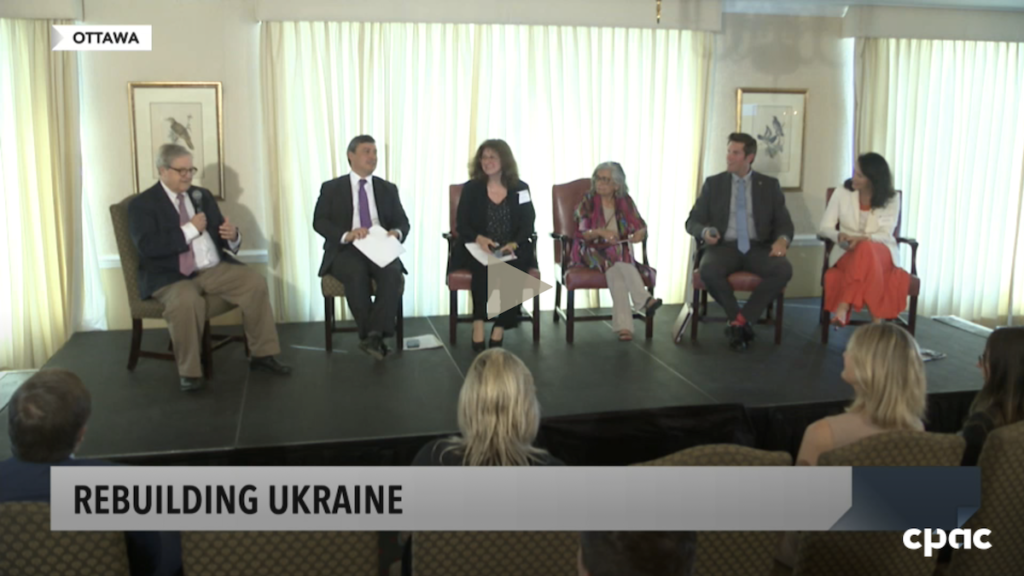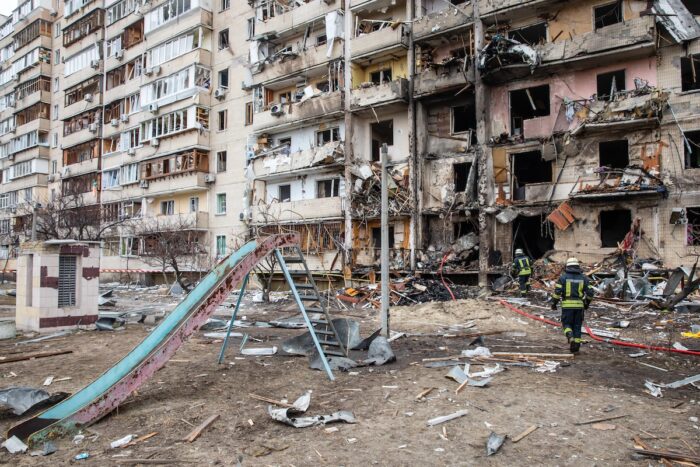NEWS RELEASE
Ottawa, June 20, 2023 — Just prior to the international Ukraine Recovery Conference in London, a high-level meeting will offer innovative solutions on how Canada and its G7 partners can move forward with new legal and economic mechanisms to hold Russia to account and help the people of Ukraine.
Organized by the World Refugee & Migration Council (WRMC), in partnership with the Embassy of Ukraine in Canada and the Parliamentary Centre, the meeting draws on two years of work by WRMC through its Groupe de travail canadien contre la grande corruption. Experts at the meeting will demonstrate that while legal obstacles around confiscation of frozen Russian oligarch and Russian state assets are complex, they do not pose a fundamental obstacle to concerted action by Canada and its G7 partners.
Watch the Forfeiting Russia’s Billions to Rebuild Ukraine Event

Among the speakers at the “Forfeiting Russia’s Billions to Rebuild Ukraine” meeting will be WRMC Chair Lloyd Axworthy; Deputy Head of Mission at the Embassy of Ukraine in Canada Andrii Bukvych; former U.S. diplomat and Executive Director of the 9/11 Commission Philip Zelikow; Independent Canadian Senator Ratna Omidvar; Ukrainian Canadian Congress President Alexandra Chyczij; former Minister of Justice Allan Rock; Mindset Social Innovation Foundation Founder Alison Lawton; and Dalhousie University Criminal Law Specialist Robert Currie. Members of Parliament Michael Chong, Heather McPherson and Ryan Turnbull will discuss opportunities for moving new mechanisms forward.
“This is an important meeting coming as it does on the eve of the London Conference. Canada’s key international leadership role on this issue, reinforced by all-party support, comes at a critical stage in this conflict,” says WRMC President Fen Osler Hampson.
Canada’s decision in 2022 to enact tools to repurpose frozen and seized assets under the Special Economic Measures act — originally a WRMC proposal to compensate victims of grand corruption, including refugees and others who have been forcibly displaced as a result, and championed by Senator Omidvar — has provided new opportunities for holding kleptocrats and others accountable.
In the last weeks Canada has taken its first formal legal actions for repurposing assets by announcing that it will confiscate and transfer to Ukraine a Russian Antonov An124 Volga-Dnepr cargo jet that was sanctioned and held in Toronto.
Building on this momentum, the WRMC and its partners have issued a wide range of new research and proposals. Two new papers, published today, provide tools and the legal basis for Canada and Canadians to help fund the reconstruction of Ukraine, as well as to support Ukrainians who have been forced to leave their country, many of whom are living in Canada.
Leading by Example: Canada’s Approach to Seizing Frozen Assets and Holding Corrupt Leaders to Account, from Robert J. Currie, Fen Osler Hampson and Allan Rock examines Canada’s precedent-setting legislation on foreign-owned asset forfeiture and how Russia’s invasion of Ukraine is shaping related policy and legislative initiatives. It lays out some of the key legal arguments for confiscation of Russian privately held funds by oligarchs as well as Russian state sovereign entities.
Canadian Ukrainian Social Impact Reconstruction Trust Fund, written by Alison Lawton — who was recently appointed to the WRMC’s anti-corruption task force — and Lauren Casey, lays out a novel funding mechanism financed partially by the proceeds of frozen or seized assets. The fund will help engage Canadians directly by mobilizing philanthropic support for Ukraine.
“This paper outlines an innovative, necessary and urgent approach to redirecting seized Russian assets,” said Mindset Foundation’s Lawton. “I look forward to working toward establishing a fund that will promote social impact and combat corruption on a global scale, one that will also help Canada take a global leadership position in redirecting Russian money towards an equitable and humane resettlement, rebuilding and reparations.”
Le Conseil mondial pour les réfugiés et la migration (wrmcouncil.org) advances bold ideas and concrete actions for resetting the global response to forced displacement through international cooperation and responsibility sharing. Chaired by former Canadian Foreign Minister Lloyd Axworthy, Council members include leaders, practitioners and innovators from developing and developed countries across the globe.
